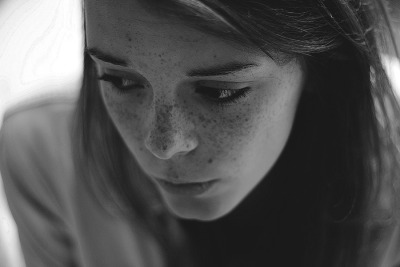HAVEN RYECROFT // D9 // FIN
Sept 19, 2013 5:41:11 GMT -5
Post by Onyx on Sept 19, 2013 5:41:11 GMT -5

haven ryecroft
sixteen
female
district nine
Out of all the children, ranging between the ages of eight and sixteen, gathered in the large, dank warehouse on the edge of District Nine, Haven Ryecroft is the only one who sits alone. A loud peal of thunder rings out and sends the corrugated roof shuddering violently, and the small groups of workers huddle closer for comfort. The youngest of the gathering cry or shriek, evidently on their first storm job, and the elders reassure them that there are only as many dangers as there would be without the freak weather. Haven smirks, the unlit cigarette that hangs casually from between her large, dark lips shifting as she does. She’d never smoke it – not for longer than one drag, anyway. It’s more a threat to the people around her that she’s not afraid to be rash with herself. That she’s not afraid of dying. In fact, Haven views death just like she does thinderstorms. They’re a hazard, certainly. But, if she’s careful, never trusting another with a job she could do herself, she knows that she can avoid being hindered by either.
The storm rolls again, bulldozing thunder across the sky and leaving a single crack of lightning in its weight. Heavy raindrops hit the roof like eggs and the little ones shriek with fear. In response, Haven wrinkles her wide, piggish nose, as covered in ugly blotches of freckles as the rest of her face, and bites down on the filter of her cigarette with a grimace. Despite her no-smoking rule, her teeth are still slightly stained by the constant chewing of cigarettes. It makes it look worse than it is, Haven promises. It’s not an addiction, just something to keep her mind occupied. Haven can’t stand being idle. Thunderstorms during working hours frustrate her. She’s been sitting on the barrel, her gangly legs – all calves and no thighs – swinging aimlessly, for around half an hour. The thick leather boots (that might as well be attached to her feet so rarely does she remove them) hit and scrape the side every once in a while, a crude imitation of the cacophony from without.
Haven remembers her own first storm job, when she was one of the youngest in this 'business'. Her large, golden-brown eyes with their short straight eyelashes were even larger, though with exhilaration, not fear. After the horrors she had witnessed in the earliest years of her life, it would take more than a little thunder to make her panic. Her gambler mother, indebted to resentful men all over the slums of District Nine, met her fate in a street attack that left her corpse almost unrecognisable - if it weren't for the telltale copper ring which was deemed worthless and so not stolen from her. It was up to four year old Haven to identify the body as her next of kin. The morals of the Peacekeepers were clearly fairly skewed, so little discomfort did they show as the vulnerable toddler stared, horrified, at the fate of the only person in the world she loved. All it took was a nod of recognition, and Haven was immediately shipped off to the Community Home.
Superstitions disgust Haven, but even she couldn’t deny that being landed in the most ill-cared for Home of District Nine could only have been fate. And not a misfortune, at all. It was there, with other ratty children who looked like her, translucent skin stretched over weak, prominent bones in their long, angry faces, spines and ribs visible through the thin, flea-covered garments they were given, that Haven learnt that she had to fight for what was hers. Whether it was the last sausage at mealtimes (Haven was beaten by the tougher, older boys) or games of cards in their bedrooms (she had learnt from her mother, and successfully cheated every hand to win), the young girl began to learn the real life skills that, in her mind, every child should know. By the time she was seven, still haunted at night by the memory of her mother’s beaten body, she was famous amongst the orphan street rats, and equally infamous amongst shopkeepers of the District slums, who were the victims of her swindles and mayhem. She was rarely seen without her stringy brown hair knotted behind her ears, and a flush in her freckled cheeks, and her big, gappy teeth gleaming with the sly smile that lit up her eyes.
Like most of the Community Homes through the District, Haven’s did not give allowances, but she and the other children often seemed to find odd jobs through which they could earn enough for pleasure. It was one of Haven’s closest companions, a boy two years older simply known as ‘Tigs’, who first came up with the plan to create an organised workforce amongst the community home residents. She was enthusiastic as the rest of the children, and they set to work thinking of where they could find a vacancy for a mass unskilled labour force in such an industrialised District. The answer came the following summer, when Haven turned nine, and the children had gone on an excursion to the large grassy banks to race in wheelbarrows. Haven wasn’t particularly strong for her age, her malnourished muscles squirming as she pushed the infants around in her barrow, but her brain made up for that, and as she gazed at the beefier kids dashing ahead of her, an idea struck her. Every factory owned one or two open-back trucks to carry raw materials and products to and from their warehouses, but these frequently broke down due to age and tiredness. What they needed was a troop who were young and energetic, to do the work for them.
Haven, as the creator of this plan, Tigs, and all the older children set out to put the scheme into action. They tried going directly to the factories and asking for employment, but they were sent away from every one they tried as “a bunch of filthy orphans scamming working men out of their hard earned money”. They needed to do something which would get the attention of the employers, not the employees – of the smaller factories, at least. And so they planned a Heist.
This plot involved staging a robbery from a string of warehouses across the slum lines, in secret but deliberate enough that they would be caught by the factory workers. It was imperative that it was them who found the thieves and not the Peacekeepers, or the whole operation would fail and the kids would end up in juvenile detention. Then, after being caught, the oldest kids would negotiate with these workers, promising that they would return everything and, so as not to cause a scene for either the factory or for their Home, they would agree to work as barrow-boys and tell no one that the company’s security had been breached by little kids, or that they had been caught in the act. The plan was a little flawed, but it involved all the kids, no matter what age, and it was seen by most just as a game, not a risky operation.
Five years on, and the original excitement of the plan succeeding and their money-making operation taking off has faded for Haven. The work is gruelling, often through dangerous junkyards or in the company of suspicious employers who would break your neck as a ‘simple form of disciple’, and sometimes Haven questions whether it was even worth the money. Granted, she has been able to buy a warm coat and boots, and has avoided applying for tesserae for the past two Reapings, but her responsibility goes beyond wheeling a barrow of stock backwards and forwards. It also means caring for the kids on their first job, making sure everyone was keeping up, reassuring her companions during storms like this one. It tries her patience, which is worn at best. Her fingers drum the barrel and she glances at her wheelbarrow, the black HAYVN painted messily onto the side as both a mark of her property and her illiteracy. There is no job until the worst of the storm had passed, and the group have no idea how long that could take… They’ve been waiting hours in the past. Logically, Haven knows that there is nothing she can do but wait, with all the others. They are a family, her only family. The thought makes her begin to relax, and the tension leaves her. Slumping forwards into her natural posture, she removes the cigarette from her teeth, licks her lips and throws it on the dusty ground. There’s no need to sit alone. Haven rises, her infectious optimism having returned despite the continuing weather, and joins the closest gaggle of kids. They’re her brothers and sisters, her colleagues and her friends, and as her responsibility extends to them, theirs encircles her, too.



































































